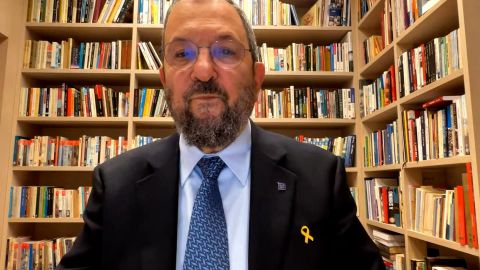Read Transcript EXPAND
CHRISTIANE AMANPOUR, CHIEF INTERNATIONAL ANCHOR: What do you make and why do you think Benny Gantz is going to meet with top U.S. officials at the White House? Netanyahu did not want him to go. He’s apparently, according to press reports, told the ambassador in Washington not to, you know, facilitate or attend any of these meetings with Gantz. What do you think could be underway?
BARAK: Look, relationship and intimate relationship with the United States are critical for the very feasibility of Israel to achieve or complete this mission. We rely upon the United States for munitions to our tanks, artillery, even the interceptors of Iron Dome. We depend upon the United States to back us financially. We depend upon them to deter it from spreading into a regional war of attrition or even a full-scale war backed by Iran and probably behind the Russia within this axis of the rouge states. We are dependent critically on the United States to protect us against a decision in the U.N. Security Council. And we even will need them in the future to help us to tackle the challenge of the hate, the criminal code in the hate. So, we cannot win a regional war without having America on our side. So, it’s critical to coordinate. Now, for reasons that I cannot explain, Netanyahu did not allow the minister of defense, who is the natural member of cabinet to go to the United States to coordinate with the Pentagon of America.
AMANPOUR: Yes. So —
BARAK: I cannot understand. So, Gantz took the challenge and he’s going there. He’s well known. He was minister of defense. He was head of the IDF. He know the people. They know him. They appreciate it. They expect to hear from him —
AMANPOUR: OK.
BARAK: — a direct and honest report of the situation. And that’s what should be done.
AMANPOUR: Mr. Barak, you’re saying what should be done. Gantz is doing it. Netanyahu doesn’t want him to do it. Netanyahu has been basically been thumbing his nose at President Biden for weeks and months. Says one thing in English to the, you know, English-speaking world, says another thing in Hebrew to his, you know, far-right coalition people. And what — and especially he’s saying no to a post-war plan that the Americans want and that most allies want. And what do you think of that? I mean, there seems to be no strategy, maybe tactics are going in a certain way, but there’s no strategy for afterwards, not even for aid delivery as we saw last week.
BARAK: It’s another grave mistake. I see the following situation. The 7th of October was the worst blunder in the history of the country. Since then, we have the longest war since the establishment of (INAUDIBLE). And the — and as I mentioned earlier, the full achievement of the military task is still months down the stream. And there is a binary choice to be made. Are we saying yes, but to Biden’s proposal, or are we going the — in the opposite direction, going together with Smotrych and Ben-Gvir, a couple of messianic racist ministers that seems to dictate to Netanyahu his behavior? And it’s a critical choice. Netanyahu totally lost the — any drop of support in the public. Four out of five Israelis sees him as the main responsible for the blunder of October 7th. Three out of four Israelis want him to resign. So, the only way to decide which — where do we go and who we lead us there is through election. So, I think that instead of all these manipulations that are basically aimed at survival, probably (ph) the survival of Netanyahu in power, the country should go to election and decide, make a decision. And it’s not anyone but Bibi. Bibi can run in this election if he wins, which he cannot, but if he wins, he will lead the country. But it’s unacceptable to the best of my judgment against the interests of the country and risk our national security to see Netanyahu keep leading this war. Eisenkot, who is another former commander of the IDF, who is now member of the war cabinet, said in a letter to other members of cabinet, no strategic decision had been made in the last three months. You are all playing with tactics and you can — we are risking both the posture of Israel in the region, in the world, but also, we are risking the very achievement that already had been achieved by the IDF because of this paralyzes and inability to take decision and move and think the day after. I personally think that the day after should have been discussed four months ago, in the first or second week, and (INAUDIBLE) publicly. There is no way. You know, there is an old Roman saying, if you don’t know which port you want to reach, no wind will take you there.
AMANPOUR: Well, in that —
BARAK: A war cannot be won if the political leadership cannot tell itself, and as a result of a direct armed forces, what is the vision for the morning after?
About This Episode EXPAND
Former Israeli PM Ehud Barak analyzes Israel’s handling of the war. Daiana Al-Bukhari is a displaced Palestinian now living in Rafah and joins the show. The Supreme Court has ruled to keep Trump on the CO primary ballot. Susan Glasser analyzes the implications. Reiko Hillyer traces the changes in America’s prison systems throughout the 20th century in her new book, “A Wall Is Just a Wall.”
LEARN MORE


